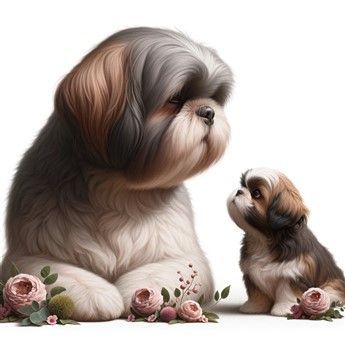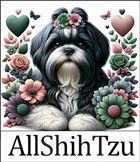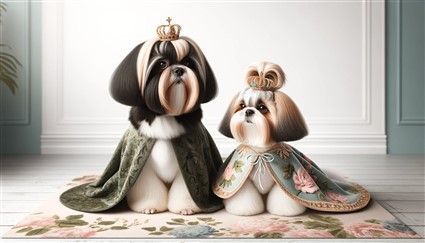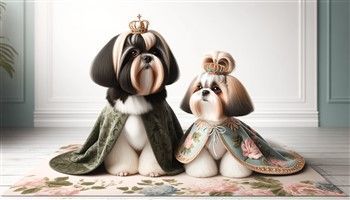Imperial and Teacup Shih Tzu
Overview
The term 'Imperial' Shih Tzu often sparks curiosity, as well as misconceptions, among dog lovers. This article aims to clarify the facts and myths surrounding the Imperial Shih Tzu, while providing insightful information on Shih Tzu sizes, imperial bloodlines, and more.
The Truth About Miniature, Teacup and Imperial Shih Tzu Dogs
When the Term Imperial is Used: Noun or Adjective
What are imperial Shih Tzu dogs? It really depends on who has dubbed the dog an 'imperial' and their reason for doing so.
It is sometimes used as an adjective to mean small. To clarify, let's remember that an 'ideal' show specimen Shih Tzu is between 9 and 16 lbs. (4.08 to 7.25 kg). Pet Shih Tzu dogs naturally fall outside of that range; anywhere between 7 and 18 pounds for adults is a typical weight for this breed. A Shih Tzu dog that falls at the low end of this range, or even under it in the 5 to 6 pound range, may be dubbed an 'imperial' meaning 'small' or 'miniature'.
So, to summarize: An Imperial Shih Tzu is not an official offshoot or variation of the breed and the term is often used to describe a Shih Tzu that is smaller than the expected weight range or as a misleading term to imply the dog has strong royal bloodlines more so that other Shih Tzu dogs.
The Imperial Label: Responsible Use in Describing Shih Tzu Size and Lineage
Size: The allure of tiny dogs has captivated a significant portion of the dog-loving community worldwide. Within this segment, there's a persistent demand for miniaturized versions of already small breeds. The Shih Tzu, a toy breed, is no exception to this trend. For these enthusiasts, the term 'Imperial' is often employed to signify Shih Tzu dogs that are smaller than the breed's average size.
To cater to this preference, some breeders engage in selective breeding to produce Shih Tzu puppies that will fall on the lower end of the official weight spectrum (9 to 16 lbs.) as adults. This practice is widely accepted within the breeding community.
Extending this further, certain breeders focus on producing dogs slightly below the AKC standard, yet within a weight range (7 to 8 pounds or 3.17 to 3.62 kg) conducive to maintaining health. These Shih Tzu dogs, often labeled 'Imperials', may not align with AKC conformation standards but, when bred responsibly, can be just as robust as their standard-sized counterparts.
Moreover, even the most meticulous breeders who adhere strictly to AKC standards occasionally produce puppies that are unexpectedly smaller. Nature often has its own plans, and in these instances, breeders might refer to these smaller puppies as 'Imperials'.

Lineage: The Shih Tzu breed boasts a rich and storied history, tracing back over 10,000 years. In recognition of this illustrious past, some breeders and pet owners choose to use the term 'Imperial' as a nod to the breed's distinguished heritage. This use of 'Imperial' transcends mere physical characteristics, serving instead as a homage to the ancestral lineage and the cultural significance of the Shih Tzu.
It's a term that celebrates not just the size, but also the royal and noble roots of the breed, reflecting the esteem and reverence held for these dogs throughout history. Such usage of 'Imperial' enriches the understanding of the Shih Tzu's place in the canine world, elevating it beyond a simple breed descriptor to a title that honors its majestic past.
Unmasking the Misuse: How 'Imperial' Becomes a Deceptive Marketing Term with Shih Tzu Puppies
As we discussed so far, the word 'imperial' can be used innocently to mean 'small' or to honor the Shih Tzu breed's heritage. But, there are instances of the term being used in disingenuous ways:
In Regard to Size: If a breeder, or other, is offering a miniature or toy Shih Tzu that is purposefully bred to be under 7 pounds (3.18 kg) as an adult, this is dangerous. The Shih Tzu breed is a sturdy dog and is by no means one of the smallest in the toy breed group. An undersized puppy could have a wide range of health issues including hypoglycemia and calcium deficiency as a pup and higher risk of hip dysplasia, tracheal issues, liver issues and more as an adult. In addition, expected life span may be shorter.
Lineage: If the term is being used to imply the dog is more regal or royal than 'regular' Shih Tzu dogs, this is misleading and should be viewed as a marketing term to steer clear of.
In Summary: It is important to understand the difference between a breeder who uses the word 'Imperial' to simply mean 'small' or to honor the breed's special place in history and others who use the word to explain the dog is much smaller than is healthy or falsely labeled as more regal.
Buying an Imperial Shih Tzu Puppy
If you've fallen in love with the breed, want a Shih Tzu puppy, and are starting your search, please keep the aforementioned information in mind as you look around. It is usually fine if pups are dubbed imperials but are estimated to fall within the AKC weight range, plus or minus 2 pounds, as adults. And it is usually fine if they are called imperials, but just as a homage to the breed and not to manipulate puppy buyers to believe the pups are special (and therefore the price for the Shih Tzu is much more money).
If you are in the US and are looking for an ethical breeder, we maintain a small list of Personally Recommended Shih Tzu Breeders; be sure to have a look.
If You Already Have an Undersized Imperial Shih Tzu
If your Shih Tzu is an imperial, meaning much smaller than the average 7 to 18 lbs. (for pet Shih Tzu dogs), taking into account the more narrow subset of 9 to 16 lbs. (for those in the showring), particular attention should be given to health issues and care surrounding little dogs with smaller frames and lighter weight than expected.
Issues to look out for and to address with the veterinarian include: struggling to gain weight, hypoglycemia, nutrient deficiencies and fragile bones. As the dog ages, there may be an early need for joint supplements. And, as with all Shih Tzu, a harness should be worn (never a collar) to help prevent tracheal issues. Do not miss veterinary health screenings.
More than ever, consider the Shih Tzu to be an 'under-the-foot' dog, taking care in regard to interactions with children in the home and those outside of it. Care should also be taken to help prevent injuries that small dogs incur such as those from jumping down off furniture, falling down staircases, etc.
Do You Have Your Book?
If you have a Shih Tzu, you'll want AllShihTzu's GIANT Book of Shih Tzu Care; it's your guide from day one and throughout your sweetie's entire life.
Lists to Love: Treat Edition
Top Fish Treats for Shih Tzus - Don’t let your Shih Tzu miss out on the powerful benefits of omega-3s. These tasty, fish-based treats support healthy skin, a shiny coat, and happy digestion, one snack at a time.
Mild Munchies for Shih Tzu with Sensitive Stomachs - These limited ingredient treats are a smart choice for pups with delicate bellies. Each is easy on digestion but still packed with tail-wagging taste.
Healthy Yummy Cheese Treats for a Shih Tzu - Is your Shih Tzu a true cheese connoisseur or a doggo who wants to be, but struggles with dairy? See these tummy-friendly options, including one long-lasting lactose-free chew that’s safe to savor and loved by even the pickiest pups.
More Articles:
Shih Tzu Colors - Explore the many beautiful colors of this breed, including solids, doubles and triples. This also leads to an informative article regarding the color changes that often occur as a puppy matures.


